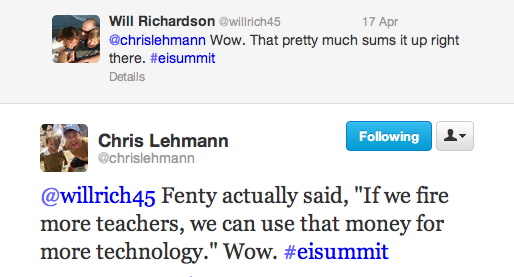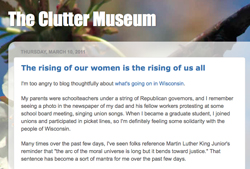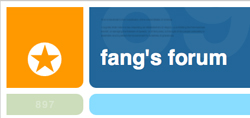(Source; h/t Audrey Watters)
Last time I checked, Boise State’s 4-year graduation rate was 8 percent.*
No, that’s not a typo. And its 6-year graduation rate hovers at 26 percent, with an overall graduation rate of 27 percent. One could quibble and point out that transfer students aren’t traditionally included in the university’s graduation rate calculations, but even if we’re only counting students who begin their college careers at Boise State, 8 and 26 percent graduation rates are pretty damn astounding, and not in a good way.
Not surprisingly, the university is feeling a good deal of pressure from the State Board of Education and the legislature to improve these graduation rates. In fact, the State Board has set an ambitious goal: 60 percent of Idahoans should have a college degree or some kind of post-secondary certificate by 2020. (Note the language of the bullet points on the State Board’s College Completion Idaho page–it’s very much about improving efficiency and quantity of post-secondary completion rates, not about quality of education.)
I’m told** by folks allegedly in the know about such things that the completion rate for online courses at Boise State is lower than the completion rate for face-to-face courses.
I’m no mathematician, but it seems to me that’s a pretty simple equation:
already low graduation rates + low completion rates for online courses ≠
improved graduation rates.
(Yes, I have written about this before.)
A digression that is not, you shall see, truly a digression
Image by Shane Lin, and used under a Creative Commons license
I haven’t commented here on the Teresa Sullivan resignation-and-reappointment scandal at UVA, and I wasn’t planning on it. But plans change, yes?
In case you didn’t watch the whole ugly mess unfold, that link to the Washington Post provides a play-by-play of what the newspaper terms “18 days of leadership crisis.” In brief, it appears the UVA president was pressured to resign because the university’s Board of Visitors believed she wasn’t leading the university down the right path to online education. Specifically, their e-mail exchanges show they referred to an article in the Wall Street Journal about the coming changes in higher ed. That op-ed enthusiastically states:
Moreover, colleges and universities, whatever their status, do not need to put a professor in every classroom. One Nobel laureate can literally teach a million students, and for a very reasonable tuition price. Online education will lead to the substitution of technology (which is cheap) for labor (which is expensive)—as has happened in every other industry—making schools much more productive.
While that may seem like a utopian future to the WSJ contributors–and I think they and I have very different definitions of “productive”–it sounds more dirge-like to those of us who work in actual classrooms with non-hypothetical students.
The e-mails sent among the Board of Visitors folks make for enlightening and disheartening reading. UVA professor Siva Vaidhyanathan captures their essence when he writes, “In the 21st century, robber barons try to usurp control of established public universities to impose their will via comical management jargon and massive application of ego and hubris.” You should click through to read his entire post at Slate, but this passage bears highlighting:
The biggest challenge facing higher education is market-based myopia. Wealthy board members, echoing the politicians who appointed them (after massive campaign donations) too often believe that universities should be run like businesses, despite the poor record of most actual businesses in human history.
Universities do not have “business models.” They have complementary missions of teaching, research, and public service. Yet such leaders think of universities as a collection of market transactions, instead of a dynamic (I said it) tapestry of creativity, experimentation, rigorous thought, preservation, recreation, vision, critical debate, contemplative spaces, powerful information sources, invention, and immeasurable human capital.
In a follow-up post, Vaidhyanathan writes, “Dragas demanded top-down control and a rapid transition to a consumer model of diploma generation and online content distribution. She wished to pare down the subjects of inquiry to those that demonstrate clear undergraduate demand and yield marketable skills.”
As many faculty at UVA and elsewhere have pointed out, UVA is actually a leader in integrating digital tools and techniques into teaching and research. Elijah Meeks, a digital humanities specialist at Stanford, praises UVA’s at once measured and innovative approach to the deployment of digital technologies in the humanities, and Vaidhyanathan details some of the successes. UVA professor Daniel Willingham wonders if Dragas et. al. are even slightly familiar with UVA’s leadership in this area.
Meanwhile, back at the ranch. . .
Because I recently had a conversation with my university’s president that suggested he’s committed to getting this whole online education thing right at Boise State, I was surprised to see him publish a post on the UVA debacle titled “A Classic Case of Public Higher Education up against the Changing Educational Marketplace.” I’m taking the liberty of quoting the entire post:
Here’s the latest example of a public university’s governing board struggling with how to offer educational programming that meets the needs of students in our 21st century cyber world. Historically, the faculty have control of the curriculum, but it is becoming increasingly clear that new mechanisms of shared governance must be invented to assure that decisions are made in a timely fashion that respond to changing student demands and needs. Apparently, the University of Virginia President spent too much time justifying the status quo decision-making apparatus of the University and the Board sought new leadership with an urgency about how the University responds to its environment. Makes sense to me.
That sound you heard? My jaw unhinging.
I had also somehow missed President Kustra’s post on a similar theme from earlier in June. An excerpt:
Here we have a veteran faculty member in the UT College of Education going over to the “dark side” with the usual and predictable mention of the inability of UT to respond to moves like this given the cutbacks in higher education budgets in Texas. Could it be that the “dark side” is the “enlightened side”, unencumbered by traditions of faculty and department control of curriculum that has been known to slow things up when universities are responding to rapid changes in the marketplace and community of ideas?
I know it’s hard to recover when the wind is knocked out of you so thoroughly. Fellow faculty, I’ll give you a moment to catch your breath.
Educators go all Hans Christian Andersen on the ed tech marketplace
We’re fortunate, I think, to have faculty like Vaidhyanathan and Willingham willing to speak out about these issues, as well as folks like Jim Groom, Martha Burtis, Alan Levine, Audrey Watters, Bryan Alexander, George Siemens, Laura Blankenship, Barbara Ganley, Barbara Sawhill, D’Arcy Norman, Mills Kelly, Amanda French, Dave Cormier, Patrick Murray-John, and Gardner Campbell,*** all of whom have, over the past several years, written thoughtfully and passionately about the truly necessary revolutions in digital learning. Another champion for logic in online education is Colorado State University professor Jonathan Rees of More or Less Bunk, who has for many months been pointing out that the Emperor of Online Education has no clothes. Here’s an excerpt from a recent jeremiad:
How much experience in the classroom does Bill Gates have? How much experience in the classroom does Helen Dragas have? Come to think of it, how much experience in the classroom do most edtech entrepreneurs have? While I know a few computer science professors have gotten involved in these startups, what boggles my mind is the number of people basically fresh off the street who seem to think they’re education experts.
(Be sure to also check out Rees’s recent posts “Frankenstein’s Monster,” “Why Stay in College?,” and “Are College Professors Working Class?”)
There are so many naked emperors in education technology–and far too many college presidents, trustees, and politicians willing to compliment ed tech marketplace “leaders” on their fine new robes.
Why I won’t be teaching online courses at Boise State anytime soon
Although I rarely act on it these days because I’m too busy pursuing tenure****, I have a deep entrepreneurial streak–something that President Kustra and others seem to celebrate in faculty–and an abiding curiosity in how we can best use digital tools to help students develop as learners and citizens. Yet I’m loath to develop any kind of online course for Boise State in part because its intellectual property policy offers a major disincentive to doing so. The policy, published on the eCampus website, states that faculty don’t retain IP rights to their own courses:
A course (as a designed collection of assembled and authored material) produced under University sponsorship, where the University provides the specific authorization or supervision for the preparation of the course, is a work made for hire (as defined by law and Boise State policy). A course specially ordered or commissioned by the University and for which the University has agreed to specially compensate or provide other support (such as release time) to the creator(s) is a commissioned work, (as defined by Boise State policy). In either case, the copyright to the course will be held and exercised by the university.
Furthermore, faculty members must get permission to re-use their course material at other institutions:
The faculty author/developer retains the right to request permission from the university to use parts of the course or the course in its entirety at another institution or setting. Granting of permission will be at the exclusive and sole prerogative of the university.
It’s funny–I didn’t realize faculty duties added up to “work for hire” (neither does the AAUP) or “commissioned work.”
Still, it’s a bit simple to boil down my objections to online-education-as-usual to intellectual property concerns. In fact, I’m frustrated that faculty control of e-course IP has been the most-vocalized theme among my Boise State colleagues. Even if I found myself in a different institutional context, my primary objections to online courses would be more in line with Rees’s than with those whose misgivings about online ed are primarily related to copyright and remuneration.
See, the tools the university and ed tech entrepreneurs expect me to use—course management systems, lecture capture, and publishers’ digital “textbook” packages–are so ridiculously sub-par that I don’t know whether to laugh or scream. I’ve had several conversations with publishers’ reps where they insist on walking me through their online environments and showing me their extensive quiz interfaces even though I tell them that I don’t quiz students or expect them to know any of the “content” that’s covered in the publishers’ sample quizzes.
They just don’t get it.
One bright spot: The Academic Technologies folks at my institution do get it, as evidenced by the terrific mobile learning summer institute they hosted at the end of May. Still, mobile learning here is in limited release, and too many of the participants were more curious about the BlackBoard app than they were about what they could have their students create or discover with the slick new iPads we all were issued.
I haven’t been present
I’ve been fairly AWOL on this blog of late, and I certainly haven’t been writing as much about educational technology as I did in the old space, circa 2006 to 2010, when the bulk of my job description involved the intersection of pedagogy and technology and when I was presenting at conferences with the Fear 2.0 posse. Mostly I’ve been too disgusted to write about the “reforms” to Idaho education. I know I am sick of hearing “reformers” claim that we should fire teachers so we can provide students with more technology–as Audrey Watters points out happened at the Davos-esque Education Innovation Summit.
That said, it’s past time for me to heed Watters’s call for educators to call the bluff of entrepreneurs and uninformed, wealthy folks who want to reform the educational sandbox by melting it down for silicon. Writing of her absence from that summit, Watters says it most eloquently:
What I learned from the Education Innovation Summit is mostly something that I learned about myself (partly because I’ve learned already about a lot of this corporate ed-tech nastiness, sadly). I learned I have to maintain my presence at these events, even when the attendees make me angry or uncomfortable. I have to continue to “speak truth to power” when it comes to education and its future. I have to be a witness. I have to provide a record. I have to speak up and speak out. I can’t let my fury stop me from writing. I can’t worry about compromising myself by being at the places where the rich and powerful are at play with our collective future, because the greater compromise is to walk away and be silent. I think that’s probably what they want, after all.
As I’ve mentioned here a couple of times, I’ve been experimenting in my history classes with mobile technologies in particular, and I plan to write more about those experiments soon. I’m just now making sense of all the data I collected from my spring-semester students on their experiences with educational technology in my class and outside of it, and I will be applying to the IRB to expand this study to my other classes. I’m looking at how we can get students using these devices to “do history”–to investigate primary sources, compile data, document people and places, create platforms to disseminate their work, and engage with the public.
Yes, of course I believe technology can be used thoughtfully with undergraduates. I continue to approach new technologies with curiosity and a good deal of eagerness.
But ed tech entrepreneurs (and others) without classroom experience who are trying to reshape my students’ learning environments in ways that make absolutely no sense? I’m ready to go all Hans Christian Andersen on their asses.
—–
* And oh look, this site suggests it’s 6 percent.
** I’d love to have some more specific figures for you, but apparently my “supervisor” (whomever that may be) needs to submit a request for me to have access to reports in the university’s data warehouse. Unfortunately, since all my computers are Macs and I don’t use Internet Explorer or run a virtual PC, I can’t access that data anyway.
*** Major oversight on my part: I’m not reading enough on this subject written by people of color. Who do you recommend I read?
**** Which you’d never know from the tenor and content of this blog post, eh?





Good for you! I have to say there’s nothing more frustrating in education policy than how utterly detached the discussion is from the research base. All we hear about in policy circles is online learning, charter schools, alternative route teacher preparation, merit pay,and how unions hurt students. Does the literature support any of these assertions? Of course not. Funny how each of these proposals also shovels education funding into the for-profit sector…..
Brava! Especially given the chasing-tenure thing (though honestly, I think many of us who are untenured — whether tenurable or not — are beginning to think that if we don’t say something now, the jobs we’re worried about losing may not be worth having in a decade or so anyway). I, too, am flabbergasted by the “unencumbered by traditions of faculty and department control of curriculum” comment. I strongly suspected such thinking was out there, but I didn’t think it was (yet) safe for a college president to actually say such things out loud/in writing (though, given the gradual erosion of tenure/faculty governance, I knew we were getting there). And the IP regulations, combined with your description of online course “packages” (which sound all too familiar), seem of a piece with this philosophy. As far as I can tell, these people really don’t understand the difference between a multimedia textbook (with or without minimally “interactive” bells and whistles) and a class: a living, breathing, evolving organism that never turns out quite the same way twice (even if you’re teaching two sections back to back using the same syllabus in the same classroom, etc., etc.) And heaven forfend we should teach history (or, in my case, writing) by collecting some materials (and expecting students to find more) and posing some questions (and expecting students to pose more) and letting things build from there (albeit with some pretty detailed instructions), with a pretty clear idea of some skills we’d like students to develop, but a fairly flexible idea of what at least some of the end products might be. I’m hoping to sneak some of the mobile-technologies stuff you mention into my writing classes (good for thinking about writing for different audiences, or at least that’s my excuse; I’m something of a closet historian), but I’m also looking at spending a lot of time making my online and hybrid classes (which have existed and, I think, succeeded pretty well, for some years now) more “assessable” (i.e., more like the publishers’ packages you describe, and, I fear, in the process, less inquiry/skills and more testable-content-oriented).
Anyway, I’ll look forward to what more you have to say about both subjects. (And now I need to go read those of your links which are new to me).
Wow–great post. Just to add to your comments on that terrible anti-faculty intellectual property policy: if faculty members own the IP for their online courses, the university has more incentive to keep those faculty members. Otherwise, not so much. Alienating faculty from the courses they develop is Step One in proletarianizing the faculty. (Or maybe it’s Step Two, and Step One is putting curriculum in the hands of administration.)
So glad you’re around to take these things on. I become incoherently angry about it and begin sputtering in irrational bursts.